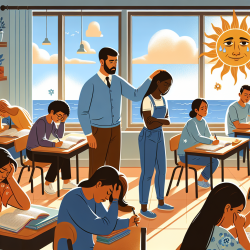Introduction
Educators often find themselves on the front lines of addressing student trauma, a role that can lead to secondary traumatic stress (STS) and compassion fatigue (CF). These conditions, while well-documented in healthcare professionals, are increasingly recognized as significant challenges for teachers. A recent systematic review, "A Systematic Review of Secondary Traumatic Stress and Compassion Fatigue in Teachers," sheds light on these issues and provides actionable insights for educators and school administrators.
Understanding STS and CF
Secondary traumatic stress refers to the emotional duress that results when an individual hears about the firsthand trauma experiences of another. Compassion fatigue, on the other hand, involves a reduced capacity for empathy due to repeated exposure to others' trauma. Both can significantly impact educators' mental health and job performance.
Key Findings from the Review
The review identifies several key themes:
- Conceptualization of CF and STS: There is a need for clear definitions and distinctions between CF and STS to better address these issues in the educational context.
- Risk Factors: Teachers working with students who have experienced trauma, particularly in special education or underserved communities, are at higher risk of developing CF and STS.
- Mitigation Strategies: Implementing trauma-informed care (TIC) practices and providing professional development can help reduce the risk of CF and STS.
- Research Gaps: There is a significant need for more research on CF and STS in educators to develop effective interventions.
Practical Applications for Educators
Based on the review's findings, educators and administrators can take several steps to mitigate the impact of STS and CF:
- Training and Professional Development: Schools should invest in training programs that equip teachers with the skills to handle trauma-related stress effectively. This includes workshops on trauma-informed practices and self-care strategies.
- Support Systems: Establishing strong support networks within schools can help teachers manage stress. Peer support groups and reflective supervision are effective ways to provide emotional support.
- Policy Changes: School policies should prioritize mental health support for both students and teachers, recognizing the bidirectional nature of student and teacher well-being.
Encouraging Further Research
The review highlights the need for more comprehensive research into CF and STS among teachers. Future studies should focus on identifying specific risk and protective factors, as well as developing targeted interventions to support educators.
Conclusion
Addressing secondary traumatic stress and compassion fatigue in educators is crucial for maintaining a healthy and effective teaching workforce. By implementing the insights from this systematic review, schools can better support their teachers, ultimately benefiting students as well.
To read the original research paper, please follow this link: A Systematic Review of Secondary Traumatic Stress and Compassion Fatigue in Teachers.










